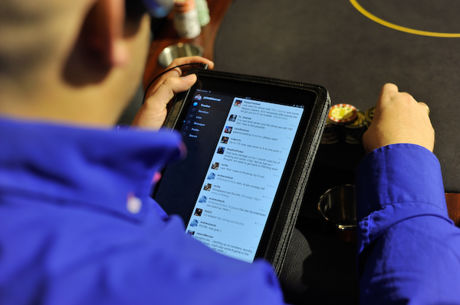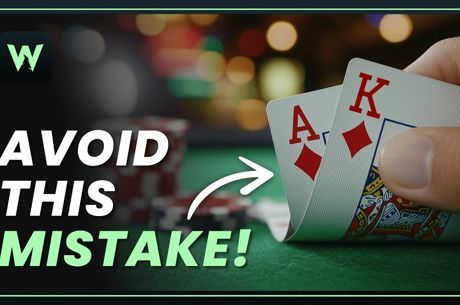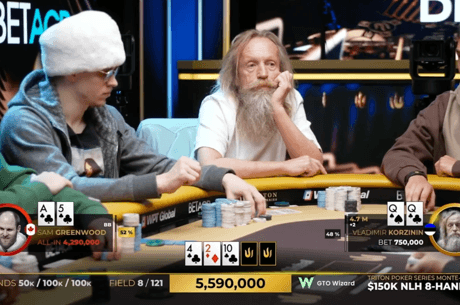Let's Talk About Seven-Way Flops: Carnage and Regret

To resume yesterday's narrative... Nine players are seated at a poker table. Each pays a 25 ante, and two post blinds of 150 and 300 in turn. The first player to act raises to 700, the next one calls, and five more call, including both blinds. The flop rolls out A♥Q♣9♠.
After the blinds check the initial raiser bets 3,100 into a pot of 5,100, the next player to act calls, and so does the button. Everyone else folds. On a 9♦ turn, the same bettor leads again, this time 7,100 into a pot of 14,400, and both of his opponents call once more.
The pot has ballooned to a monstrous 35,700 — over 100 big blinds — when the river brings the 6♠.
How Did Things Get So Out of Control?
At this point all three players have at least 18,325 behind (the second player to act is the effective stack). As we move to the last part of the story, let's first review three principles:
- Every bet or raise should narrow the range of hands with which any opponent continues
- The more players in a pot on any street, the more narrow a continuing player's range should be
- Betting can win the pot in two ways, but calling relies on winning at showdown
Put these principles together, and a suitable continuing range gets far narrower than you might currently recognize.
What Can the UTG Player Now Bet for Value?
You may have heard the notion of "over-representing" one's hand. This is the risk the betting player is taking in this situation, even with a hand as strong as AxQx. Why? Because the other players should be able to get away from hands worse than AxQx easily.
In other words, there simply isn't much value to be had when holding AxQx. What hand is worse than AxQx here? AxKx? AxJx? Is AxKx really going to pay off three streets, three-way on the river, after all this action? Doubtful.
The conclusion we must draw, then, is if the UTG player has made it to this river with AxQx, he can't bet for value.
This logic goes further. If the player can't get value from AxKx, then he must be looking for value from stronger hands — payoff hands like AxQx and better (e.g, trips and full houses). Then we can say that if the potential hands that will pay him off are AxQx, Ax9x, or Qx9x even (or some unlikely 9xXx combination of trips), his value betting range must include AxAx, QxQx, 9x9x, and maybe the two combinations of Ax9x-suited.
What Happened?
The player under the gun unloaded the third barrel, betting 13,100. The player next to act then moved all in for 18,325 total. The button finally got out of the way, and the UTG player called.
The all-in player revealed a hand suitable for shoving — QxQx. He had just called preflop, which was reasonable, also called the flop and the turn, and went for the extra 5,200 chips in value by shoving the river.
The under the gun player could not beat Ax9x — he had 10x9x-suited for trip nines, no kicker.
The UTG player's hand looks strong. It certainly looked strong to him, whose eyes must have lit up when the turn card came as he looked crestfallen to be beaten on the river.
But if we analyze this hand in its totality, we realize that actually his hand isn't strong at all given the action that has taken place. Again, we'll harken back to what we were discussing yesterday about range advantage and multi-way pots.
The strength of every hand in poker is conditioned on the situation in which the hand finds itself. How cold the pool is, if you will.
Among worse hands, the UTG player's river bet can only be called by AxQx. Because of this, the betting with 10x9x really isn't much of a value bet. And when his opponent raises the river with two other players still in the pot, the UTG player probably shouldn't even throw in the extra 5,200 chips in the middle — good money after bad money, as they say.
That's because he is beaten 99% of the time by his opponent's raising range.
How Far Practice Strays from Theory
By the way, I learned later the button had AxJx. Live poker is not dead, it turns out.
It is hard to quantify just how losing the button's turn call was. The player, an out-and-out nice guy by the way, put 7,100 chips into a pot with a probable return less than 1,000.
Before I knew the hand he held, I had guessed he made a losing call with Jx10x (losing for the reasons enumerated yesterday). But it is important to realize that calling the turn with Jx10x is not nearly as large an error as doing so with AxJx here. For example, when the UTG player is overplaying 10x9x (which he was) or even AxQx, Jx10x can still outdraw these hands.
Of course, he also needs more to go right. He needs the second-to-act player not to be trapping. He needs to hit his hand. And he needs to get paid off by non-nutted hands that didn't have him dead on the turn. So in short, Jx10x is a losing call, but the hand has a lot of showdown value on a Kx or 8x river when his opponents check to him. That scenario won't happen often, but it will happen.
AxJx, on the other hand, can basically only hit an ace. There may only be one in the deck, and if he does draw it he may only be chopping — or worse! After all, AxJx can still get stacked by 9x9x or AxQx.
If we had to hand out marks for this hand, we should unfortunately give the button a failing grade. He should have folded the flop, by force of our second principle listed above ("the more players in a pot on any street, the more narrow a continuing player's range should be"). But instead he somehow saw his way to the river.
Meanwhile the eventual winner who held QxQx had an interesting flop decision. Should he have raised after the UTG player led (and there were five others still in the hand)? I have to think no. It is better to call and keep the collective range of his opponents as wide as possible, so as not to reduce the potential value of his hand.
He doesn't have to go broke if a straight draw fills in or a backdoor flush appears, after all. For his part, he probably made the correct decision at every point — calling both the flop and turn, then raising the river.
But let's think about that river.
Flat-calling the river might have baited the button behind to have overcalled. The river bet was 13,100, which is what a button call would have been worth. By moving all in, he shuts out the button to win an extra 5,200 from the UTG player (who can still possibly have better, too).
Finally, going back to the UTG player's decisions, he should not have continuation bet the flop into such a huge field. He has strong made hands that can balance the Jx10x-suited and KxJx-suited semi-bluffs he might bet into six opponents on the flop. There is no reason to think 10x9x-suited is going to have enough improvability or showdown value to handle six opponents, or that the strong part of his range is capacious enough to balance a hand that weak.
Meanwhile, it is very hard to recalibrate your head once you hit a card as good-looking as that 9♦ was on the turn (especially for players with less experience). All should be forgiven, really, after that point. But low marks for the continuation bet which catapulted him to calamity.
Teachable Showdowns
Narrow range situations can help us understand fundamental concepts by their discrete nature. Combinations become more countable and solutions tend to transparency as more money enters the pot.
Just as you should fold AxKx under the gun at a 20-handed table, and just as you should not put 900 big blinds into the pot preflop with QxQx, so, too, should you continue with caution in a seven-way flop.
In this hand some players did that and some players did not. The former were richer for it and the latter poorer.
Gareth Chantler is a professional poker player, independent writer, and journalist. Follow him on Twitter , and visit his site .
Want to stay atop all the latest in the poker world? If so, make sure to get PokerNews updates on your social media outlets. on Twitter and find us on both and !









